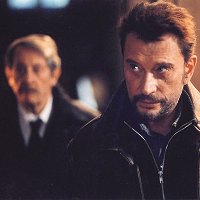
 Leconte is one of those filmmakers whose movies never look anything alike. He delights in subverting genres, playing with the look of a film, getting into the characters and settings with intricate detail. This film is no exception. It's about two men who meet by accident and completely alter each others' lives. Milan (Hallyday) is the titular man, who leaves the train in a small town and ends up staying with the fusty old Manesquier (Rochefort) when the hotel turns out to be closed. Milan obviously has a purpose for being here, and Manesquier slowly figures it out. Soon these two very different man see something in each other that sparks their imaginations--Manesquier sees in Milan the man he always fantasised about being (a bank robber), while Milan sees Manesquier as the man he wishes he could someday become, settled into a quiet, comforting routine, alone and far from the violence ... and the morons he has to work with. Where they end up is wholly unexpected, and owes not a little to David Lynch.
Leconte is one of those filmmakers whose movies never look anything alike. He delights in subverting genres, playing with the look of a film, getting into the characters and settings with intricate detail. This film is no exception. It's about two men who meet by accident and completely alter each others' lives. Milan (Hallyday) is the titular man, who leaves the train in a small town and ends up staying with the fusty old Manesquier (Rochefort) when the hotel turns out to be closed. Milan obviously has a purpose for being here, and Manesquier slowly figures it out. Soon these two very different man see something in each other that sparks their imaginations--Manesquier sees in Milan the man he always fantasised about being (a bank robber), while Milan sees Manesquier as the man he wishes he could someday become, settled into a quiet, comforting routine, alone and far from the violence ... and the morons he has to work with. Where they end up is wholly unexpected, and owes not a little to David Lynch.
Every element of this film is so finely tuned that it's hard to criticise. Leconte opens the film like a Western with the stranger arriving in an empty town that seems to be rolling itself up to get away from him. Then we enter Manesquier's fading and overcrowded little world, contrasted against the set-up for the robbery ... and other things that add to Leconte's mysterious tapestry. Hallyday and Rochefort simply inhabit their characters--we never doubt them for a second, miles apart in every way and yet discovering a surprising point where their hearts and minds intersect. Meanwhile, Leconte directs with style and colour, drawing us in with humour and a spark of suspense because we haven't a clue where the story might be going, but we know full well that it's going somewhere intriguing. There are life-changing decisions everywhere, regrets to rectify, futures to plan--all due to a random encounter. In the end it's a bit surreal and light (yes, at the same time), but it's so delightfully done that we don't mind at all.
 |
themes, language, violence | 22.Oct.02 lff |
scr Claude Klotz
with Jean Rochefort, Johnny Hallyday, Charlie Nelson, Jean-Francois Stevenin, Pascal Parmentier, Edith Scob, Isabelle Petit-Jacques, Olivier Fauron, Veronique Kapoian, Maurice Chevit, Armand Chagot, Riton Liebman
release UK 21.Mar.03
Canal+
02/France 1h30

Changing places? Manesquier and Milan (Rochefort and Hallyday) see themselves in each other, even though they're opposites...
 Support Shadows: Buy a Poster
Support Shadows: Buy a Poster
|

 "Enjoyable in parts and pleasingly idiosyncratic with pithy insights, this film somehow doesn't add up to the sum of its parts. Rochefort is wasted as a nobody who portrays a stunted life; while Hallyday makes an unconvincing gangster, though you could stare at his face for hours. It feels more like a collection of ideas than a true meeting of flesh and blood and the scenes veer from sentimentality - the slippers - to ridiculous contrivance - the encounter in the brasserie. All in all a film which may have sounded good on paper but fails to engage in practice." --Dirk, London 12.Apr.03
"Enjoyable in parts and pleasingly idiosyncratic with pithy insights, this film somehow doesn't add up to the sum of its parts. Rochefort is wasted as a nobody who portrays a stunted life; while Hallyday makes an unconvincing gangster, though you could stare at his face for hours. It feels more like a collection of ideas than a true meeting of flesh and blood and the scenes veer from sentimentality - the slippers - to ridiculous contrivance - the encounter in the brasserie. All in all a film which may have sounded good on paper but fails to engage in practice." --Dirk, London 12.Apr.03